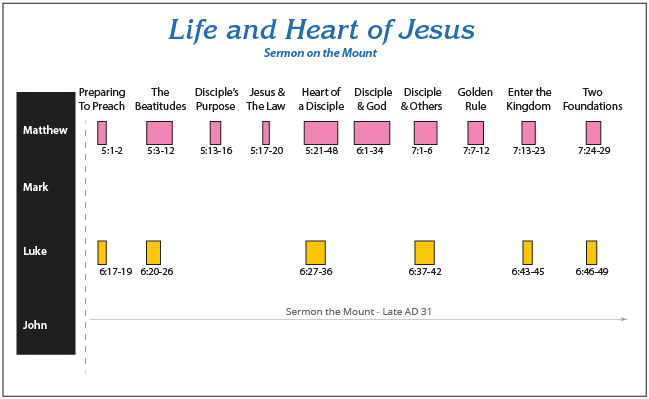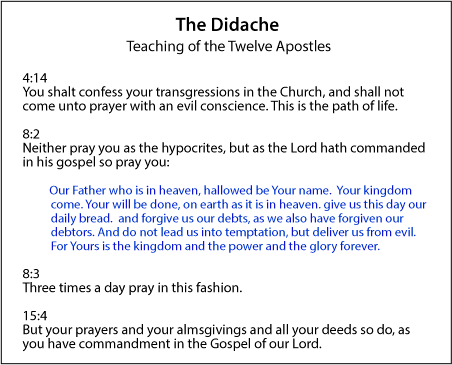Many books, sermons, essays, Bible studies, and various multimedia have been devoted to the subject of prayer. There is one prayer, however, that has received the most attention. Most of the followers of Jesus call it the “Lord’s Prayer.” In some churches this prayer is recited every Sunday. In fact, the only prayer some people ever say is the Lord’s Prayer. The Lord’s prayer has been translated into at least 1,300 languages. Yet, when asked to pray, some of us do not know what to say.
One mother discovered this the hard way on a very hot summer day. The house was full of guests as mom was hurrying to put the food on the table. The guests were seated, and in her hurry she asked her seven year old daughter to pray. Her daughter did not know what to say. So mom told her daughter, “Just say the last prayer you heard from me.” The daughter bowed her head and said, “Oh, Lord, why did I invite all these people on such a hot day?” We can be sure the guests were surprised, but especially mom. Her daughter needed to be taught how to pray and so do we. In this study we will look at a section of Matthew 6 that we skipped in our last study. The section is known as the “Lord’s Prayer.” But as we will discover, it is actually “Our Prayer” – or how we should pray.

Teaching Tool
The Lord’s Prayer was the result of a disciple’s question about how to pray. The question was asked because Jesus had warned them to not pray as their religious leaders did. If you were a disciple who had been taught how to pray by the scribes, Pharisees, and/or Sadducees and then Jesus warned you to not pray like them, you might also ask Jesus how to pray!
Earlier in Matthew 6:5-7 Jesus had warned them to not stand on the street corners seeking attention as the religious did, and He had encouraged them to pray without seeking approval as a holy person. He warned them against giving money, praying, and fasting in public. So the disciples wanted to know more.
The Jewish religious leaders had many rules about prayer. In the Mishnah, they encouraged every Jew to pray the eighteen benedictions per day (Berkahot 4.3). There were morning, afternoon, and evening prayers. There are rules about when a person could pray and what to pray (Berkahot 1.5). There were rules about when to lie down and pray (Berkahot 1.3). Berkahot 2.3 indicates that a Jew could recite the Shema softly and fulfill his prayer obligation if he quoted it without error. There were prayers before one studied. In The Mishnah we read the following:
One may stand to pray in a solemn frame of mind. The pious ones used to tarry one hour [before they would] pray . . . (Berkahot 5.1).
Just imagine standing one hour before starting to pray! You were considered holy if you did. Imagine a prayer meeting where one of the members stood to pray and then everyone waited one hour before he or she would start to pray. It is said that Dwight L. Moody did not like long public prayers. One time at the close of a service, a guest speaker was finishing his message with a long prayer. His prayer was so long that after a while D. L. Moody turned to his song leader and said, “Lead us in a hymn while our brother is finishing his prayer.” There is no virtue in long prayers.
It is important to notice that Jesus did not give them any instruction about standing, sitting, lying down, walking, running, or driving an automobile while one prays. Jesus did not talk about head coverings, kneeling, the position of one’s hands, or closed eyes. Why? God wants us to pray at all times (1 Thessalonians 5:17 ) and in every place, under any condition, and in various situations (1 Timothy 2:8).
Repetitive Prayer
Just before Our Prayer, Jesus warned the disciples against repetitive prayers.
And when you are praying, do not use meaningless repetition as the Gentiles do, for they suppose that they will be heard for their many words. Matthew 6:7 (NASB)

What does Jesus mean by “meaningless repetition?” Have you ever asked and asked God for something again and again? God is interested in sincere prayers that come from a sincere heart. He does not care for meaningless ones. Even Jesus prayed three times in the Garden of Gethsemane (Matthew 26:36-46). The Apostle Paul prayed three times about his thorn in the flesh (2 Corinthians 12:7-16). Have you ever prayed for something again and again in an attempt to motivate God to answer your prayer? I once did. God is not interested in manipulative prayer. He is interested in sincere prayer from a heart that willingly submits to His will. Yes, prayer can be repetitive but not manipulative. God already knows what you need.
So do not be like them; for your Father knows what you need before you ask Him. Matthew 6:8 (NASB)
He is watching our hearts. He is looking for our submission and sincerity. Even though God knows what we need, He sometimes waits for us to ask (James. 4:2).
Our Father
How do you pray? When you speak to God, do you pray like this, “O Lord, please help me . . .?” Some people pray like this, “I pray that you will . . .” We are distant and cold. But if we were speaking to a friend named Bob, we would eventually speak something like this, “Bob, could you help me?” after we had asked him how he is doing and maybe shared your feelings about the day. Notice how Jesus encouraged us to pray.
Pray, then, in this way: “Our Father who is in heaven, hallowed be Your name.” Matthew 6:9 (NASB)
Jesus’ opening statement is intimate. The first word, “Our” is personal. He did not teach us to speak to an idol or a table, but to a person – someone who exists in heaven.
The word “hallowed” in the Greek means “holy.” Jesus is encouraging us to talk about Him at the start of our prayer and not about ourselves. This is good for us. We need to remember the characteristics of God. It is interesting that Jesus selected “holy.” He used one of the characteristics of God that is true only of Him. Only God is holy. Jesus did not pick love. He could have, but He did not. We know about love. We practice love, but sometimes we do not. He could have used “kindness,” but He did not. We are kind but not always. No, Jesus used a characteristic of God that is totally unique to Him. When we pray, we can include other characteristics about God such as: He is all-wise, all-powerful, all-knowing, loving, present everywhere, and infinite.
Notice that Jesus assumed that God hears us. God hears every prayer that is made to Him: believer and non-believer. Recently, I was asked if God refuses to hear the prayer of those who sin, including sinning Christians. The answer is that God hears every prayer. He knows even our thoughts (Psalm 139:2). But scripture does teach that God will not answer the prayers of those who do not repent of their sins (Psalm 66:18). But to those who do not believe in Him and then turn and seek Him, He will listen. He is interested in the heart. A heart that is content with its sin has a problem.
Your Will Be Done
Then Jesus teaches us to ask that His will be done on earth just as it is in heaven.
Your kingdom come. Your will be done, on earth as it is in heaven. Matthew 6:10 (NASB)
Jesus tells us that our first request should be that God’s kingdom would come to earth. God’s kingdom already exists (Ps. 45:6;24:10; 29:10; 95:3). God’s kingdom will eventually come to earth. It will come at the end of the world. Later in the New Testament, we are also encouraged to pray that Jesus will come quickly and establish His kingdom. God wants us to pray that His kingdom will come. That is God’s desire.
Jesus also teaches in the prayer that God is in total control in heaven. Here on earth, God allows Satan and his fallen angels to have some control. God also gives the fallen descendants of Adam great but not total freedom. When we pray, we want God to answer our request. Yet, Jesus encourages us to ask that God’s will be done here on earth, in your life, and in my life. God’s will is more important than your will and mine. What you may ask for in your prayer is not more important than how God should answer it. We are to ask for His will. In Jesus’ model prayer, we have not asked for anything about ourselves yet.
Now Our Requests
Jesus’ prayer has been personal and not distant. He has been centered on God the Father’s desires. Now God the Son teaches us how we can make our requests. Our requests should follow a time of worship.
Give us this day our daily bread. Matthew 6:11 (NASB)
This is the first request. The rest of the prayer is all about us too! Jesus tells us that it is okay to ask God to meet our needs. We can ask that God meet our material needs such as food, clothes, a job, a home, and other items. But God has not promised, as some teach, that God will make believers wealthy. We cannot find that in scripture. Some of the saints of old were wealthy such as Abraham, Joseph, King David, King Solomon, and Job. Wealth hinders many from coming to God. A survey conducted by the Barna Group has confirmed that people with greater wealth are less likely to come to Jesus. Jesus made that clear in the gospels (Matthew 19:24). God will hear the prayer of repentant hearts and meet their basic needs. We can praise Him for the many additional things that He provides.
Forgive Us
Next Jesus teaches us that we need to ask for forgiveness.
And forgive us our debts, as we also have forgiven our debtors. Matthew 6:12 (NASB)
This is a spiritual request. The Greek word Jesus uses for “debts” is opheilema. It refers to a moral and spiritual debt incurred due to sin. Each one of us incurs a moral and spiritual debt when we sin, because we have sinned against God. God is holy and we are not. To God, sin must be like garbage infested with maggots. It is amazing that God is as kind, forgiving, and loving to us as He is. When we sin, we have a debt. We deserve to go to eternal punishment.

Those who have believed in Jesus Christ and have trusted Him to forgive all of their sins already have all of their sins forgiven. God has forgiven all of their past, present, and future sins. So is Jesus referring to the sins of believers? Do believers need to make this request? The answer is yes! Every follower of Jesus gets dirty from sin even though it will be forgiven. Those who do not mourn their sin are not believers and followers of Jesus. No matter how spiritually mature a believer becomes, he or she will always have sin to mourn. This was the message of Matt. 5:4.
The holier a man becomes, the more he mourns the unholiness which remains in him. – Spurgeon
Jesus is talking about our day-to-day walk on this earth. Yes, the followers of Jesus are forgiven forever, but day-to-day we become “dirty” and need to be cleaned up. This is the same message of 1 John 1:9.
If we confess our sins, He is faithful and righteous to forgive us our sins and to cleanse us from all unrighteousness. 1 John 1:9 (NASB)
Those who do not believe in Jesus have not been forgiven yet, and the rest of the verse does not apply to them. They cannot have their sins forgiven since they do not believe in the only one who can forgive them (Acts 4:12).
As We Forgive
What does Jesus mean by “as we forgive our debtors”? The Greek word used for “debtors” is opheilemetes and it refers to someone who has sinned against you. That is, Jesus encourages us to forgive others too!
Be kind to one another, tender-hearted, forgiving each other, just as God in Christ also has forgiven you. Ephesians 4:32 (NASB)
The passage is in the present tense. This means that we are to be actively forgiving others. This is one of the marks of followers of Jesus Christ – they forgive others. Two verses away Jesus adds these words as further explanation,
For if you forgive others for their transgressions, your heavenly Father will also forgive you. But if you do not forgive others, then your Father will not forgive your transgressions. Matthew 6:14-15 (NASB)
Then later Peter asks Jesus how many times he, Peter, should forgive others. Jesus said seven times seventy. At the end of a parable about forgiveness Jesus states that the Father will even discipline us when we will not forgive (Matthew 18:35).
One who claims to follow God should be a person who forgives. If he/she does not forgive, it is doubtful that he/she is following God. It is doubtful that the Holy Spirit is living within and spiritually changing him/her. So one who is not forgiving others will not be forgiven because he/she does not belong to God and only God knows of whom this is true.
Lead Us Not Into Temptation
Jesus adds this curious statement,
And do not lead us into temptation, but deliver us from evil. [For Yours is the kingdom and the power and the glory forever. Amen.] Matthew 6:13 (NASB)
The Greek word for “temptation” refers to a “trial.” So Jesus is encouraging us to ask that we be protected from trials or testing. Some believe that this is a heart’s cry asking for protection from a trial of our faith. But there is a sense in which God allows us to enter into a trial or a test. God allowed Job to be tested (Job 1-2). God has allowed all of His children to be tested. It is one of the ways we grow in our faith (James 1:2-4). James 1:13-14 also tells us that God cannot be tempted, and He does not tempt anyone. But He will allow us to be tested. Our request is simple. “Please, God, do not allow me to enter into a trial. I am afraid that I might sin.” But He might let us enter into trials since He uses tests to grow us spiritually. If He does, we need to remember,
No temptation has overtaken you but such as is common to man; and God is faithful, who will not allow you to be tempted beyond what you are able, but with the temptation will provide the way of escape also, so that you will be able to endure it. 1 Corinthians 10:13 (NASB)
The last part of the verse (Matthew 6:13) is in brackets because the better manuscripts do not include it. Therefore, the ending of the passage is in doubt. Even if the words do not belong, the words are accurate and true.

Conclusion
The Didache (A.D. 100-120) includes the Lord’s Prayer or Our Prayer. This is one of the earliest Christian books. It captures the early practices of the followers of the apostles. The Lord’s Prayer was already highly valued. It is a reminder to treat Him as a person (He is), to honor God first in our prayer, ask that His kingdom come soon, that His will be done among us, and then to make our requests. Do not forget to ask for forgiveness and protection from trials or spiritual tests.
Are you looking for more teaching on the Lord’s Prayer? Then visit, “What Jesus Taught About Prayer.” It contains three sermons:
What Does God Want When You Pray?
May the Lord bless your prayer.
Suggested Links:
Sermon on the MountWhat Jesus Taught About Prayer